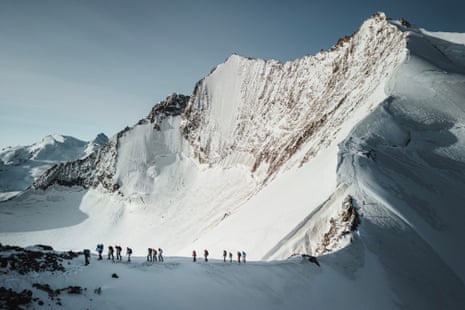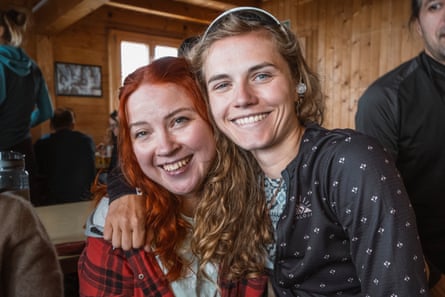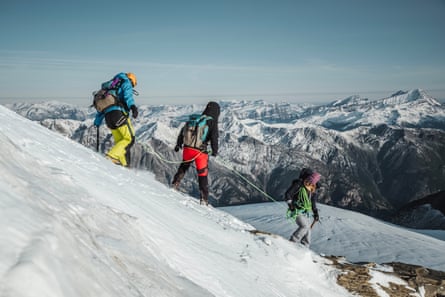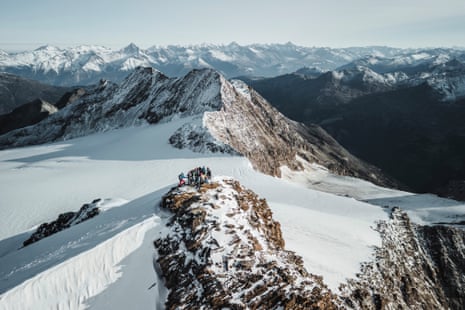At 4,000 metres, conditions can be challenging. The air is thin, movement takes effort, and the ice and snow demand proper gear: warm layers, crampons, an ice axe, ropes for crossing glaciers.
Yet a group of refugees in Switzerland – from Afghanistan, Iran, Palestine, Ukraine and elsewhere – say this is exactly where they have found freedom, calm and even respite from the trauma of war, political persecution and imprisonment.
“Mountaineering isn’t just a sport. Reaching the summit brings an incredible sense of relief. And it’s proof that you can overcome your physical and emotional challenges, even after extreme hardship,” says Soroush Esfandiary, 27, adding that the Alps remind him of growing up near Iran’s Zagros mountains, but also of his escape from home.
Esfandiary arrived in Switzerland four years ago, initially crossing the mountains from Iran into Turkey on foot. “I had a high fever and was coughing up blood, but I kept moving. I was so afraid,” he says.
After joining the mass protests in Iran in 2019, initially sparked by a sudden surge in fuel prices, Esfandiary was imprisoned and put in solitary confinement for two weeks in Isfahan intelligence prison. When he was released to await his trial, he knew he had to leave.
Soon after reaching Switzerland, Esfandiary joined Peaks4All, a Geneva-based non-profit that supports refugee integration through mountaineering.
“It’s more than mountaineering though,” he explains. “We’re a group of people from all over the world, connected by what we’ve been through. We are all here in Switzerland to find peace.”
The idea of offering mountaineering to refugees in the Swiss Alps all started with two female mountaineers:
“We came up with it because of our passion for Alpinism and social impact,” says Laëtitia Lam, who co-founded Peaks4All with her friend and fellow mountaineer Clémence Delloye.
“What started as a one-off project with just a handful of people has grown into a community of more than 200 refugees from across the globe, from Nigeria and Sudan, to Mongolia, Turkey and Syria. We also work with 40 volunteers and 30 mountain guides. I’m proud to say that we’ve also gone from having almost no women refugees in the group to over 40% today,” she says.
Since 2022, Peaks4All has made one big climb a year: last year it was Ulrichshorn at 3,925 metres. Another summit is planned for this year. In between, the group regularly offers smaller hikes and other mountain activities such as bouldering and canyoning.
Lam, whose father fled from Hong Kong to France for political reasons, says Peaks4All’s goal is to bridge the gap between refugees and Swiss communities.
“We realised that many refugees live quite isolated lives and we wanted to open up new possibilities with the courses and training we offer,” she says. “At the same time, we saw that being together in nature had a big impact. The mountains became a place of peace and happiness for many.”
Unlike Esfandiary, many at Peaks4All haven’t previously spent much time in the mountains. Diana Lysenko, 39, says: “I immediately said yes to training for and climbing a 4,000-metre [13,000ft] mountain, but I had no idea what to expect. The highest mountain in Ukraine is barely half the size of some of the Swiss peaks.”
Lysenko arrived in Geneva in the summer of 2022, just months after the start of Russia’s full-scale invasion.
after newsletter promotion
“I realised the situation in Ukraine was only going to get worse, and I couldn’t handle living in constant fear any more, spending nights in bomb shelters and hoping that it wouldn’t be my building getting destroyed,” she says. Lysenko had previously lived in Kyiv and said many of her colleagues were killed when Russia invaded several towns surrounding the Ukrainian capital.
“Integration was initially quite hard in Switzerland, that’s why Peaks4All was such a great opportunity. Climbing also helped me discover an inner strength I didn’t know I had,” she adds.
The use of nature to support trauma recovery and mental wellbeing is gaining momentum and becoming a growing focus of research, including in the UK. Initiatives such as Dose of Nature for example, advocate for the mental health benefits of connecting with nature.
Alem Big Qaderi, 26, an Afghan who arrived in Switzerland in 2023, says he felt “happy, safe, and hopeful for the future” when in nature. Climbing alongside people from around the world, he says, feels like being in a “global village.”
After the Taliban seized control of Afghanistan in August 2021, thousands fled the country. Qaderi had been studying in Turkey at the time, but knew there was no way to return home.
In Europe, including in Switzerland, many refugees say they face challenges integrating, especially as politics in many countries have shifted further to the right.
“At Peaks4All, we’ve created an amazing family. No matter where you are from and what language you speak,” Lam says.
“For me, mountains have no nationality,” says Qaderi. “The Alps remind me of the mountains of my childhood. They feel like home.”














